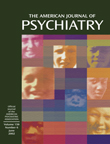Are Impaired Childhood Motor Skills a Risk Factor for Adolescent Anxiety? Results From the 1958 U.K. Birth Cohort and the National Child Development Study
Abstract
OBJECTIVE: Neurodevelopmental impairments have been associated with early-onset schizophrenia, early-onset bipolar disorder, and childhood-onset affective disorder. The authors investigated whether delayed childhood motor skills predicted persistent anxiety in adolescence among 6,850 subjects from a national 1958 U.K. birth cohort. METHOD: This historic cohort study used data from the National Child Development Study that was collected when its subjects were 7, 11, and 16 years old. RESULTS: Boys with poor motor skills had more than threefold the odds of maternally rated anxiety at the ages of 11 and 16, but no effect was observed for girls. CONCLUSIONS: Childhood motor impairment was strongly associated with persistent anxiety among male, but not among female, adolescents. The effect modification by sex was greater than expected, as was the effect size for boys. Both findings warrant replication and further examination.



